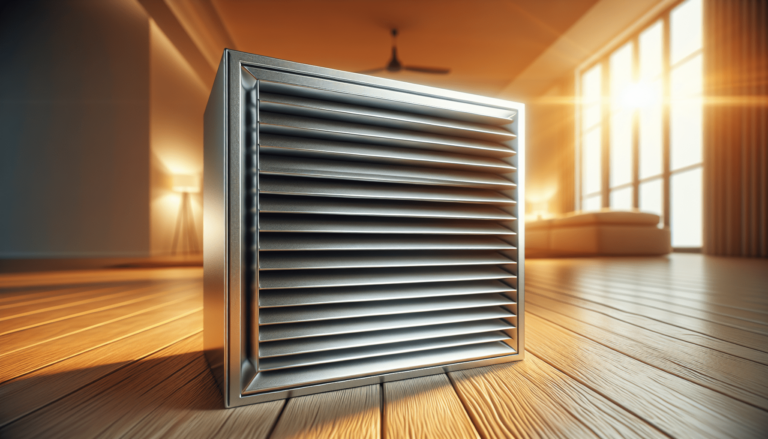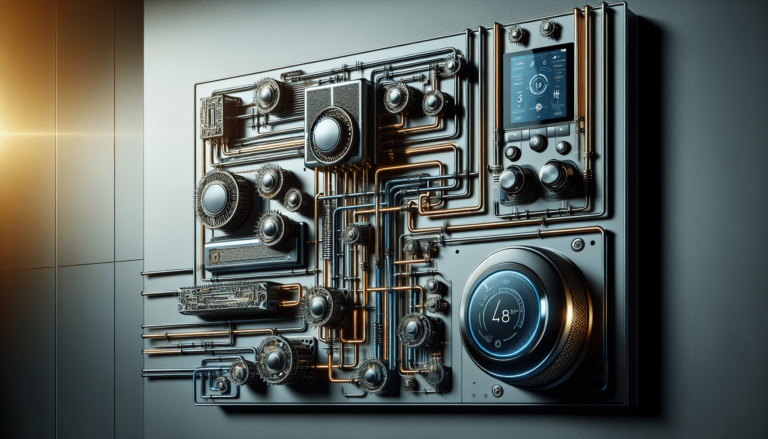

HVAC Services
Get Professional Repairs From The Area's Trusted HVAC Technicians. Ask About Our Services! We Offer Professional Heating & Cooling System Repairs And Guarantee Long-Lasting Results.
Got Question? Call us: (850) 678-2665Financing
Geothermal HVAC: Benefits And Installation Guide
Discover the benefits of geothermal HVAC systems and learn how to install one in your home. Save money, help the planet, and enjoy consistent comfort year-round.
Have you ever wondered if there’s a more efficient and eco-friendly way to heat and cool your home? Geothermal HVAC systems might just be the answer you’re looking for. Imagine a system that harnesses the consistent temperatures found underground to provide both heating and cooling. Sounds intriguing, right? Let’s delve into the world of geothermal HVAC to see how it can benefit you and guide you through the installation process.
What is Geothermal HVAC?
Geothermal HVAC (Heating, Ventilation, and Air Conditioning) systems utilize the stable temperatures beneath the Earth’s surface to regulate the temperature inside your home. Unlike traditional air-source systems that rely on fluctuating outdoor air temperatures, geothermal systems tap into the relatively constant temperatures found a few feet underground.
How Does It Work?
The core principle behind geothermal HVAC is pretty straightforward. By circulating a water-based solution through a series of pipes buried in your yard (commonly known as ground loops), the system can absorb heat from the ground or disperse heat into it, depending on whether you need heating or cooling. Think of it as borrowing the Earth’s natural energy to keep your home comfortable.
The Components
To better understand how geothermal HVAC systems operate, let’s break down the essential components:
| Component | Function |
|---|---|
| Ground Loops | These pipes are buried underground and serve as the heat exchanger. |
| Heat Pump | Transfers the heat between the ground loops and your home. |
| Ductwork | Distributes heated or cooled air throughout your home. |
| Distribution System | Connects the heat pump to your home’s heating and cooling system. |
Each part works in harmony to provide efficient temperature regulation, making geothermal HVAC systems a compelling choice for homeowners.
The Benefits of Geothermal HVAC
Switching to a geothermal HVAC system can offer a multitude of benefits. If you’re seeking efficiency, long-term savings, and an eco-conscious solution, then geothermal HVAC might be well-suited for you.
Energy Efficiency
One of the most significant advantages is the high energy efficiency. Because the system leverages the Earth’s stable underground temperatures, it requires less electricity to operate compared to conventional HVAC systems. Energy Star-rated geothermal heat pumps can achieve efficiency ratings of up to 45% more than standard HVAC units.
Cost Savings
While the initial installation costs can be higher than traditional systems, the operational savings over time can be substantial. According to the Environmental Protection Agency (EPA), homeowners can save up to 70% on heating and up to 50% on cooling costs. These savings typically offset the initial investment within 5-10 years.
Environmentally Friendly
Geothermal HVAC systems produce very low levels of greenhouse gases compared to fossil fuel-based heating systems. By using renewable energy from the ground, they reduce your carbon footprint significantly, making them an environmentally responsible choice.
Longevity and Durability
The underground components like the ground loops have a lifespan of about 50 years, whereas the indoor components can last up to 25 years with proper maintenance. This longevity surpasses that of most traditional HVAC systems, offering peace of mind for many years.
Quiet Operation
Gone are the days of intrusive, noisy HVAC units. Geothermal systems operate quietly, as the loudest components are either buried underground or inside your home.
Installation Guide
Considering a geothermal HVAC system for your home? Here’s a step-by-step guide to help you understand what’s involved in the installation process.
Site Evaluation
The first step is a thorough site evaluation. A professional from a reputable company like Tempacure Heating and Air Conditioning will:
- Assess your property’s geology and hydrology: To determine the best system for your home.
- Conduct a load calculation: To ascertain the heating and cooling needs of your home.
- Evaluate the available space: To decide whether horizontal or vertical ground loops would be more suitable.
Choosing the Right System
Based on the site evaluation, you’ll need to choose the best type of geothermal system for your property:
| System Type | Description | Suitable For |
|---|---|---|
| Horizontal Loop | Pipes are placed in long, shallow trenches. | Homes with ample yard space. |
| Vertical Loop | Pipes are inserted into deep holes. | Homes with limited space or rocky soil. |
| Pond/Lake Loop | Pipes are submerged in a nearby water source. | Homes near a lake or pond. |
Pre-Installation Preparation
Before breaking ground, there are a few preparatory steps that need to be taken:
- Permitting and Zoning: Ensure that you have all the necessary permits. Your HVAC contractor will often handle this, but it’s good to be informed.
- Site Clearing: Clear the area of any obstructions like trees, rocks, or underground utilities.
- System Design: Finalize the design based on the type of system chosen and the load calculations.
Ground Loop Installation
The actual installation begins with the ground loops:
- Excavation: Trenches or boreholes are dug to the appropriate depth.
- Pipe Installation: Pipes are carefully laid out and connected to form a closed-loop system.
- Backfilling: After the pipes are in place, the trenches or boreholes are backfilled to ensure proper soil contact.
Heat Pump Installation
Once the ground loops are in place, the focus shifts indoors:
- Placement: The heat pump unit is typically installed in the basement or a mechanical room.
- Connection: The pipes from the ground loop are connected to the heat pump.
- System Integration: The heat pump is connected to your home’s ductwork and heating/cooling distribution system.
System Testing and Commissioning
After everything is in place, the system needs to be tested:
- Loop Pressure Testing: Ensures there are no leaks in the ground loop system.
- Electrical and Refrigerant Checks: Verifying that electrical connections and refrigerant levels are correct.
- System Run Test: Conducted by your contractor to ensure the system is working efficiently.
Enjoy Your New System
With everything set up and tested, it’s time to enjoy the comfort of your new geothermal HVAC system. Regular maintenance and periodic inspections are crucial to keep the system running smoothly for years to come.
Maintenance Tips for Longevity
To maximize the lifespan and efficiency of your geothermal HVAC system, regular maintenance is key. Here are some tips to keep it operating smoothly:
Routine Inspections
Schedule regular inspections, preferably once a year, to check the system’s overall health. A professional can identify and address minor issues before they become significant problems.
Filter Changes
Like any HVAC system, geothermal systems have filters that need to be replaced periodically. Change the air filter every 1-3 months, depending on usage and manufacturer recommendations.
Coil Cleaning
Ensure the heat pump’s indoor coils are clean. Dust and debris can reduce efficiency, so it’s vital to check and clean these coils as needed.
Ground Loop Checks
The ground loops are generally low-maintenance, but it’s a good idea to monitor for any unusual signs, such as leaks or ground heaving. While unlikely, catching these issues early can prevent costly repairs.
Thermostat Settings
Use a programmable thermostat to ensure you’re not wasting energy when you’re not home. Set it to maintain comfortable but efficient temperatures, optimizing both comfort and savings.
Comparing Geothermal with Traditional HVAC
When deciding on an HVAC system, it can be helpful to compare geothermal systems with traditional ones. This can guide you to make an informed choice based on your needs and circumstances.
| Feature | Geothermal HVAC | Traditional HVAC |
|---|---|---|
| Energy Efficiency | Up to 45% more efficient than standard systems | Varies, generally less efficient |
| Environmental Impact | Low emissions, uses renewable energy | Higher emissions, uses fossil fuels |
| Operational Cost | Lower, with significant savings on utility bills | Higher, due to less efficiency |
| Installation Cost | Higher initial cost | Lower initial cost |
| Lifespan | 25-50 years with proper maintenance | 15-20 years, depending on system type |
| Maintenance | Requires annual maintenance but less frequent replacements | More frequent repairs and replacements |
Common Misconceptions
Despite their growing popularity, geothermal HVAC systems are often misunderstood. Let’s debunk some common myths:
Myth 1: Too Expensive
While the initial investment can be higher, the long-term savings and potential incentives like tax credits often make it a financially sound choice.
Myth 2: Not Suitable for All Climates
Geothermal systems work well in virtually all climates because they draw from the relatively constant temperature of the Earth, which is not affected by the weather above ground.
Myth 3: Complicated Technology
Although the technology might seem advanced, geothermal HVAC systems operate on simple principles and are actually less prone to breakdowns due to fewer moving parts compared to conventional systems.
Myth 4: Requires Large Properties
While horizontal ground loops do require more space, vertical loops allow geothermal systems to be installed on smaller properties. Additionally, pond/lake loops offer alternatives for homes near water bodies.
Financial Incentives and Rebates
Investing in a geothermal HVAC system can be more accessible thanks to various incentives and rebates. Beyond the operational savings, these can significantly reduce the initial cost.
Federal Tax Credits
In the United States, the federal government provides tax credits for geothermal system installations. For instance, homeowners can receive a tax credit of up to 26% of the installation cost.
State and Local Incentives
Many states and local governments offer rebates and incentives. These can include reduced installation costs, tax deductions, and rebates. Check with local authorities or your HVAC contractor for programs that may be available in your area.
Utility Rebates
Some utility companies provide rebates to encourage the use of energy-efficient systems like geothermal HVAC. These rebates can further offset the installation cost.
Financing Options
Many HVAC companies, including Tempacure Heating and Air Conditioning, offer financing options. These plans can spread the cost over time, making it more manageable for homeowners.
Is Geothermal HVAC Right for You?
Deciding on the right HVAC system is a significant decision that depends on various factors, including your budget, property size, and long-term goals. If you’re looking for a sustainable, efficient, and cost-effective solution, geothermal HVAC systems are definitely worth considering.
Personalized Assessment
A personalized assessment from a professional HVAC company can provide specific insights into your individual situation. They can analyze your property, energy needs, and financial considerations to offer tailored recommendations.
Professional Consultation
Consulting with a professional also offers the advantage of leveraging their expertise. They can guide you through the entire process, from initial site assessment to final installation and maintenance.
Conclusion
With numerous benefits like improved energy efficiency, cost savings, environmental friendliness, and quiet operation, geothermal HVAC systems present a compelling alternative to traditional heating and cooling systems. While the upfront costs may be higher, the long-term advantages make it a worthy investment.
So, if you’re contemplating a switch to geothermal HVAC, this guide should equip you with all the information you need. Ready to take the next step? Reach out to professionals like Tempacure Heating and Air Conditioning who can help you navigate the process from start to finish.
Contact Information
For more personalized advice and professional installation services, you can contact Tempacure Heating and Air Conditioning at:
Address: 325 Cedar Ave S, Suite B, Niceville, FL 32578
Phone: (850) 678-2665
Website: Tempacure HVAC







